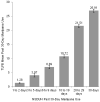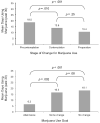Reliability and validity of young adults' anonymous online reports of marijuana use and thoughts about use
- PMID: 22082344
- PMCID: PMC3413779
- DOI: 10.1037/a0026201
Reliability and validity of young adults' anonymous online reports of marijuana use and thoughts about use
Abstract
With growing interest in online assessment of substance abuse behaviors, there is a need to formally evaluate the validity of the data gathered. The current investigation evaluated the reliability and validity of anonymous, online reports of young adults' marijuana use and related cognitions. Young adults age 18 to 25 who had smoked at least one cigarette in the past 30 days were recruited over 14 months to complete an anonymous online survey. Of 3,106 eligible cases, 1,617 (52%) completed the entire survey. Of those, 54% (n = 884) reported past-month marijuana use (65% male, 70% Caucasian, mean age was 20.4 years [SD = 2.0]). Prevalence of marijuana use was reported reliably across three similar items, and interitem correlations ranged from fair to excellent for measures of marijuana dependence symptoms and thoughts about marijuana use. Marijuana use frequency demonstrated good construct validity through expected correlations with marijuana use constructs, and nonsignificant correlations with thoughts about tobacco use. Marijuana frequency distinguished among stages of change for marijuana use and goals for use, but not among gender, ethnicity, or employment groups. Marijuana use and thoughts about use differed by stage of change in the hypothesized directions. Self-reported marijuana use and associated cognitions reported anonymously online from young adults are generally reliable and valid. Online assessments of substance use broaden the reach of addictions research.
2013 APA, all rights reserved
Figures


References
-
- Acton GS, Prochaska JJ, Kaplan AS, Small T, Hall SM. Depression and stages of change for smoking in psychiatric outpatients. Addictive Behaviors. 2001;26(5):621–631. doi: 10.1016/S0306-4603(01)00178-2. - PubMed
-
- Adamson SJ, Kay-Lambkin FJ, Baker AL, Lewin TJ, Thornton L, Kelly BJ. An improved brief measure of cannabis misuse: The Cannabis Use Disorders Identification Test-Revised (CUDIT-R) Drug and Alcohol Dependence. 2010;110(1-2):137–143. doi: 10.1016/j.drugalcdep.2010.02.017. - PubMed
-
- Adamson SJ, Sellman JD. A prototype screening instrument for cannabis use disorder: the Cannabis Use Disorders Identification Test (CUDIT) in an alcohol-dependent clinical sample. Drug and Alcohol Review. 2003;22:309–315. doi: 10.1080/0959523031000154454. - PubMed
-
- Adler NE, Epel ES, Castellazzo G, Ickovics JR. Relationship of subjective and objective social status with psychological and physiological functioning: Preliminary data in healthy white women. Health Psychology. 2000;19:586–592. - PubMed
-
- Alexander D. A marijuana screening inventory (experimental version): description and preliminary psychometric properties. American Journal of Drug and Alcohol Abuse. 2003;29(3):619–646. - PubMed
Publication types
MeSH terms
Grants and funding
LinkOut - more resources
Full Text Sources
Medical
Miscellaneous

